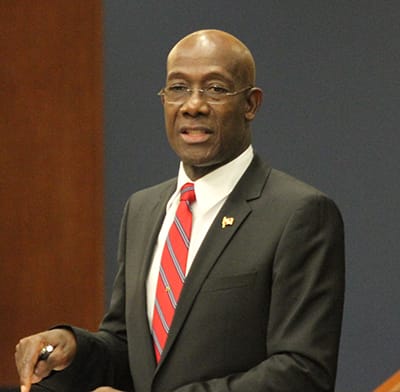
The Trinidad and Tobago government Friday presented legislation to Parliament seeking to amend the constitution so as to grant further autonomy to the island of Tobago within the context of the sovereign democratic state of Trinidad and Tobago.
Prime Minister Dr. Keith Rowley told legislators that the Constitution (Amendment) (Tobago Self Government) Bill, 2018 would be sent to a Joint Select Committee (JSC), adding that he hopes “it will be received and advanced to the satisfaction of all the people of our beloved Republic of Trinidad and Tobago, particularly our brothers and sisters in Tobago”.
Rowley said that the JSC should report to the Parliament by July 31 this year.
Rowley, who gave a historical overview of the relationship the two islands have shared over a number of years, said that 120 years after the union of Trinidad and Tobago “it is opportune that the basis for the advancement of the sovereign democratic state is reformatted.
He said the legislation had been developed “after a very long and transparent process of research, extensive public consultations and a genuine desire to advance and improve the process of granting further autonomy to the Island of Tobago within the context of the sovereign democratic state of Trinidad and Tobago”.
“The amendment of the Republican Constitution which establishes the present foundation is necessary to provide the autonomy which Tobago requires. This will allow Tobago to play a meaningful role in the fulfillment of the Sustainable Development Goals as well as to advance and align Tobago’s development towards the attainment of Vision 2030”.
Rowley said that the document had been developed as a “policy document for the enactment of legislation to advance the process of self-government and autonomy for Tobago”.
In his statement to Parliament, Rowley said that in 1977, the late president, Arthur Napoleon Raymond Robinson, then political leader of the Democratic Action Congress (DAC) and a Member of Parliament for Tobago East, presented a motion in Parliament which called for internal self-government for Tobago. “This motion was endorsed by the other Tobago Member of Parliament, Dr. Winston Murray, who emphasized that the motion called, not for secession, but for internal self-government. Mr. Robinson’s motion was eventually adopted, albeit with amendments.”

Rowley said that in 1979, a draft bill examining internal self- government for the island was prepared but that it was rejected by the then Cabinet noting “the reason given for the rejection of the proposals was that they derogated from the concept of a unitary state.”
He said following the veto of the bill, the then government opted instead to pass the Tobago House of Assembly Act, 1980.
“This Act made provision for the Tobago House of Assembly (THA) to formulate and implement policy on all matters referred to it by the Minister and to be responsible for implementing in Tobago, Government policy relating to certain matters of national importance, including economic planning, programming and development of Tobago resources; the provision of adequate infrastructure; and finance, in particular, the raising and collection of revenue.”
Rowley said that the 1980 Act also enabled the THA to make by-laws for the proper management of facilities operated by it and provided for a Finance and General Purposes Committee and other Committees of the THA.
“A Tobago House of Assembly Fund was also established. Overall, the 1980 Act was at complete variance with the internal self-government anticipated by Mr. Robinson and Dr. Murray in the 1977 parliamentary motion.”
Rowley said that in 1996, the THA and the Tobago House of Assembly Fund were enshrined in the Constitution and that the 1980 Act was repealed and replaced by the Tobago House of Assembly Act, 1996.
“The constitutional arrangements and those of the 1996 Act, which are currently in formulation and implementation of policy in relation to matters assigned to the THA in the Fifth Schedule of the 1996 Act remain, however, subject to the general direction and control of Cabinet by virtue of section 75(1) of the Constitution.”
He said that the THA is empowered to propose and adopt Bills which would then be transmitted to Cabinet with a request for them to be enacted by Parliament.
“The Bills must not be inconsistent with any written law of Trinidad and Tobago. When enacted the Bills would be known as “Assembly Laws”. However, no such laws have ever been made. The current arrangements, therefore, fall short of internal self-government for Tobago, even as envisaged more than 30 years ago….”
He said in 2005 the THA adopted a resolution calling on the government “to pursue as a matter of urgency legislative and/or constitution reform to accord to the people of Tobago democratic internal self-government inter alia”.
The THA appointed a Select Committee to study the matter and in 2006, then Prime Minister Patrick Manning laid before Parliament the draft, prepared by the late Sir Ellis Clarke, of a new Constitution for Trinidad and Tobago.
But Rowley said that with the inadequacies of the 1996 Act and the failure of the Clarke draft Constitution to effectively address Tobago matters, private citizens on the island and the THA, mobilised and sought to ascertain the view of Tobagonians on constitutional reform, governance, and other issues.
“There was no general call for the break-up of the union but rather for a different structure of government and governance. It was pointed out that the present Constitution does not define Trinidad and Tobago as a unitary state, i.e. a state with a strong central government and a measure of devolution – which can be revoked at any time – to local government bodies and the THA.”
Rowley said that in early 2010 the Tobago Forum group presented to the public its report entitled Proposals for Constitutional Reform from a Tobago Perspective. It was stressed that the Report made no demand for secession or for a break-up of the union of Trinidad and Tobago.”
He said that in 2012, a Green paper on internal self-government for Tobago was published by the then government “in keeping with the undertaking in the People’s Partnership Manifesto to pursue “the principle of autonomy” for Tobago, and against that background to “amend all existing laws to be consistent with and give legal and administrative effect to the new constitutional arrangement between Tobago and Trinidad”.
Prime Minister Rowley said that following the 2013 Tobago House of Assembly election, the then chief secretary, Orville London, met with other political leaders in Tobago to discuss the issue of self-determination or greater autonomy for Tobago.
“The objective of these meetings was to engage in discussions geared towards adopting a common approach to addressing the matter of self-government for Tobago and the constitutional arrangements between Tobago and Trinidad,” he said, adding in an effort to assist the political exercise, a team of persons, independent of the partisan politics, a Secretariat, was engaged to assist in the forward movement of the entire process.
Rowley said that more than 40 meetings were held with groups, individuals and sectors throughout Tobago and in Trinidad between 2014 and 2016.
He said in its manifesto for the 2015 general election, the now ruling People’s National Movement (PNM) outlined support for the self-government and that soon after becoming head of government he received a briefing document entitled “Tobago’s Position on Its Right to Self Determination”.
Advertise with the mоѕt vіѕіtеd nеwѕ ѕіtе іn Antigua!
We offer fully customizable and flexible digital marketing packages.
Contact us at [email protected]















